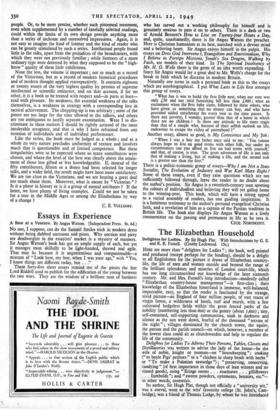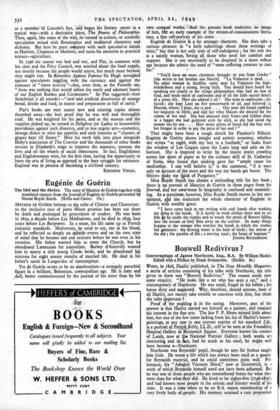The Elizabethan Household
Delightes for Ladies. By Sir Hugh Plat. With Introductions by G. E. and K. R. Fussell. (Crosby Lockwood. 15s.)
HERE are more than " delightes for Ladies " ; the book, well printed and produced (except perhaps for the binding), should be a delight to all Englishmen for the picture it draws of Elizabethan country- life, the life of men and women outside and beyond the range of the brilliant splendours and miseries of London court-life, which has too long circumscribed our knowledge of the later sixteenth century. Mr. and Mrs. Fussell's long introduction—modestly called " Elizabethan country-house management "—is first-class • their knowledge of the Elizabethan hinterland is immense, well-balanced, impeccable, easy, so that the reader is fascinated by the strange, vivid picture—an England of four million people, of vast tracts of virgin forest, a wilderness of heath, turf and marsh, with a few cultivated hedgeless fields within 'the great fenced parks of the nobility (numbering less than 600) or the gentry (about 1,600) ; tiny, self-contained, self-supporting communities, sunk in darkness and silence as the sun went down, fearful of the thousand " terrors of the night " ; villages dominated by the church tower, the squire, the parson and the parish council—on which, however, a member of the lowest class could sit as churchwarden and help to regulate the life of the community. Delightes for Ladies To Adorne Their Persons, Tables, Closets and Distillatories was written to advise the lady of the house—be she wife of noble, knight or yeoman—on " housekeeping ": cooking (" to boyle Pigs' petitoes " or a " chicken in sharp broth with herbs " or " To make a Polonian sawsedge"); "preserving, conserving, candying " (of first importance in those days of lean winters and no tinned goods), using "Eringe rootes . . . roseleaves . . . gilliflowers
. . Iumbolds "; and " sweete powders, oyntments, beuaties, etc."— in other words, cosmetics.
Its author, Sir Hugh Plat, though not officially a "university wit," was a coeval, went to the wits' favourite college (St. John's, Cam- bridge), was a friend of Thomas Lodge, by whom he was introduced
as a member of Lincoln's Inn, and began his literary career in a typical way—with a derivative piece, The floures of Philosophie. Then, again, like some of the wits, he turned to science, or scientific speculation mixed with Renaissance and mediaeval chemistry and alchemy. But here he parts cosnpany with such speculative minds as Harriott, Chapman or Marlowe, and turns his attention to practical science—agriculture.
In 1596 the season was bad and wet, and Plat, in common with his class and the Privy Council, was worried about the food supply, not merely because the people would starve, but much more because they might riot. In Remedies Against Famine Sir Hugh inveighed against speculators juggling with the currency and against the rumours of " foren scarcity "—but, even then, as the Fussells say, " there was nothing that would soften the steely and adamant hearts of our English Rookes and Cormorants." So Plat suggested—how Stracheian it all sounds!—" new and artificial discoveries of strange bread, drinke and food, in matter and preparation so full of rarity."
Plat's books are very scarce now and existing copies almost thumbed away—the best proof that he was well and thoroughly read. He was knighted for his pains, and as the seasons and the supplies picked up, he turned in Delightes for Ladies to housewifely providence against such disasters, and to less urgent arts—cosmetics, strange dishes to whet the appetite and such luxuries as " clusters of grapes kept till Easter." Here his work falls into place alongside Hoby's translation of The Courtier and the thousands of other books written in Elizabeth's reign to improve the manners, sweeten the lives and oil the wheels of social intercourse. In fact, Englishmen and Englishwomen were, for the first time, having the opportunity to learn the arts of living as opposed to the bare struggle for existence. England was in process of becoming a civilised country.
KENNETH YOUNG.



































 Previous page
Previous page